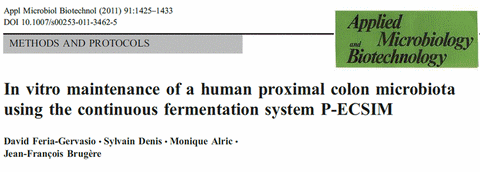2011 - Appl. Microbiol. Biotechnol.
Abstract
Ethical and technical difficulties for in vivo studies on gut microbiotas argue for the development of alternative in vitro models: here, we describe a system simulating the proximal part of a human colon both nutritionally and physico-chemically with a procedure aimed to limit experimental variations over the time (Proximal Environmental Control System For Intestinal Microbiota--P-ECSIM). The continuous culture system P-ECSIM is first inoculated by a -20 °C glycerol stock established from the batch culture of a stool-inoculated medium. The anaerobic atmosphere is self-maintained by the gases produced in the ordinary metabolism of fermentations. The monitoring of metabolic activities and microbial constitutions indicates that different steady states are obtained according to the dilution rate. Finally, the glycerol conservation of the batch culture-derived inoculum gives a similar differential response between the two dilution rates (D = 0.08 h⁻¹ and D = 0.04 h⁻¹) after a 1-year storage time as well for their metabolism and constitution in steady states, but with a lower abundance. Molecular fingerprints of the microbiota reveal however alterations over the time. Further efforts are needed concerning the preservation of standardized inoculums in order to improve the process for intra- and inter-lab comparison. Combined with appropriate analytical techniques, this system provides an efficient alternative means of studying functionally human microbiota in its constitution, metabolism and adaptation to environmental changes, particularly nutritional.
Feria-Gervasio D, Denis S, Alric M, Brugère JF.
Feria-Gervasio D, Denis S, Alric M, Brugère JF.
In vitro maintenance of a human proximal colon microbiota using the continuous fermentation system P-ECSIM.
Appl Microbiol Biotechnol. 2011 Sep;91(5):1425-33.
doi: 10.1007/s00253-011-3462-5. Epub 2011 Jul 20. PubMed PMID: 21773764.
